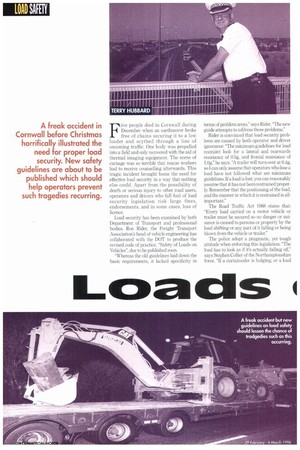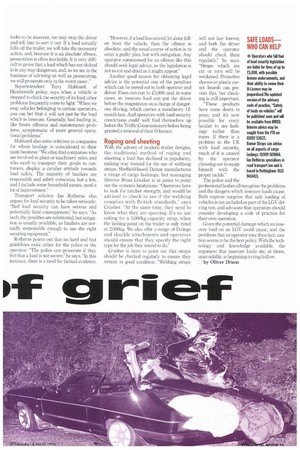A freak accident in Cornwall before Christmas horrifically illustrated the
Page 36

Page 37

If you've noticed an error in this article please click here to report it so we can fix it.
need for proper load security. New safety guidelines are about to be published which should help operators prevent such tragedies recurring.
Five people died in Cornwall during December when an earthmover broke free of chains securing it to a low loader and scythed through a line of oncoming traffic. One body was propelled into a field and only recovered with the aid of thermal imaging equipment. The scene of carnage was so terrible that rescue workers had to receive counselling aftenvards. This tragic incident brought home the need for effective load security in a way that nothing else could. Apart from the possibility of death or serious injury to other road users, operators and drivers who fall foul of load security legislation risk large fines, endorsements, and in some cases, loss of licence.
Load security has been examined by both Department of Transport and professional bodies. Ron Rider, the Freight Transport Association's head of vehicle engineering has collaborated with the DOT to produce the revised code of practice, "Safety of Loads on Vehicles", due to be published soon.
"Whereas the old guidelines laid down the basic requirements, it lacked specificity in terms of problem areas," says Rider. "The new guide attempts to address these problems."
Rider is convinced that load security problems are caused by both operator and driver ignorance: "The minimum guidelines for load restraint look for a lateral and rearwards resistance of 0.5g, and frontal resistance of 1.0g," he says. "A trailer will turn over at 0.4g, so I can only assume that operators who lose a load have not followed what are minimum guidelines. If a load is lost, you can reasonably assume that it has not been restrained properly Remember that the positioning of the load, and the manner in which it is restrained is allimportant."
The Road Traffic Act 1988 states that: "Every load carried on a motor vehicle or trailer must be secured so no danger or nuisance is caused to persons or property by the load shifting or any part of it falling or being blown from the vehicle or trailer."
The police adopt a pragmatic, yet tough attitude when enforcing this legislation: "The load has to look as if it's actually falling off," says Stephen Collier of the Northamptonshire force. "If a curtainsider is bulging, or a load looks to be insecure, we may stop the driver and tell him to sort it out. If a load actually falls off the trailer, we will take the necessary action, and, because it is an absolute offence, prosecution is often inevitable. It is very difficult to prove that a load which has not shifted is in any way dangerous, and, as we are in the business of advising as well as prosecuting, we will prosecute only in the worst cases ."
Superintendent Terry Hubbard, of Humberside police, says when a vehicle is stopped to check the security of its load, other problems frequently come to light: "When we stop vehicles belonging to certain operators, you can bet that it will not just be the load which is insecure. Generally, bad loading is, like hours offences and maintenance problems, symptomatic of more general operational problems."
Hubbard also aims criticism at companies for whom haulage is coincidental to their main business: "We often find companies who are involved in plant or machinery sales, and who need to transport their goods to customers. display a cavalier attitude towards load safety. The majority of hauliers are responsible and safety conscious, but a few, and I include some household names, need a lot of improvement."
Transport solicitor Ian Rotheras also argues for load security to be taken seriously: "Bad load security can have serious and potentially fatal consequences," he says. "As such, the penalties are substantial, but mitigation is usually available, as hauliers are normally responsible enough to use the right securing equipment."
Rotheras points out that no hard and fast guidelines exist either for the police or the operator: "The police can prosecute if they feel that a load is not secure," he says. "In this instance, there is a need for factual evidence. "However, if a load has moved, let alone fallen from the vehicle, then the offence is absolute, and the usual course of action is to enter a guilty plea, but with mitigation. Any operator summonsed for an offence like this should seek legal advice, as the legislation is not as cut and dried as it might appear."
Another good reason for obtaining legal advice is the potential size of the penalties which can be meted out to both operator and driver. Fines can run to £5,000, and, in some cases, an insecure load can put the driver before the magistrates on a charge of dangerous driving, which carries a mandatory 12month ban. And operators with load security convictions could well find themselves up before the Traffic Commissioners before being granted a renewal of their 0-licence.
Roping and sheeting
With the advent of modern trailer designs, the traditional method of roping and sheeting a load has declined in popularity, making way instead for the use of webbing straps. Sheffield-based Damar manufactures a range of cargo lashings, but managing director Brian Crusher is at pains to point out the system's limitations: "Operators have to look for ratchet strength, and would be advised to check to see if the webbing complies with British standards," says Crusher. "At the same time, they need to know what they are speccing. It's no use asking for a 5,000kg capacity strap, when the lashing point on the trailer is only rated at 2,000kg. We also offer a range of 0-rings and shackle attachments and operators should ensure that they specify the right type for the job they intend to do."
Crusher is keen to point out that straps should be checked regularly to ensure they remain in good condition: "Webbing straps will not last forever, and both the driver and the operator should check them regularly," he says. "Straps which are cut or torn will be weakened. Protective sleeves or plastic corner boards can prevent this, but checking is still important.
"These products have come down in price, and it's now possible for every haulier to use lashings rather than ropes. If there is a problem in the UK with load security, much of it is caused by the operator choosing not to equip himself with the proper tackle."
The police and the professional bodies all recognise the problems and the dangers which insecure loads cause. Both express surprise that safe loading of vehicles is not included as part of the WV driving test, and advocate that operators should consider developing a code of practice for their own operation.
Given the potential damage which an insecure load on an LGV could cause, and the problems that an operator may then face, caution seems to be the best policy. With the technology and knowledge available, the argument that insecure loads are, at times, unavoidable, is beginning to ring hollow.
17 by Oliver Dixon




































































































